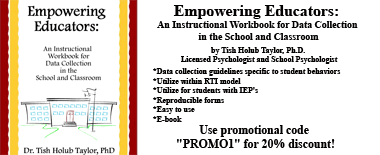| Dear NASET Members: Welcome to NASET's WEEK in REVIEW. Here, we provide you with the latest publications from NASET to read and download, as well as some of the most interesting issues that have happened this week in the field of special education. We hope you enjoy this publication. Feel free to send us articles for this publication or let us know your thoughts about the WEEK in REVIEW at news@naset.org .Have a great weekend.
Sincerely,
NASETNews Team |
| New This Week on NASETLesser Known Disorders in Special Education SeriesIssue # 1 January 2010NASET is proud to announce the beginning of a new series devoted to lesser known disorders that you may encounter in special education. While not as prevalent as other disorders experienced by most special education teachers, you should be aware of these disorders in order to become more knowledgeable, and increase your ability to assist patents of children with these disorders if they should appear in your classroom or school. Each month we will present a list of 3 disorders that appear in the special education population. Some of these disorders may contain subtypes which will also be presented. You will also notice that each disorder has a code. These codes represent the coding system for all disabilities and disorders listed in the Educator's Diagnostic Manual (EDM) Wiley Publications.
Disorders discussed in the issue are: - Rett Syndrome
- Mental Retardation due to Prader-Willi Syndrome
- Apraxia of Speech (Verbal Apraxia or Dyspraxia)
To read and or download this issue: Click Here (login required) ______________________________________________________________ Assessment in Special Education SeriesThe Multidisciplinary Team and the Comprehensive AssessmentThe use of a multidisciplinary team (MDT) in the assessment of a student with a suspected disability is part of the existing laws in special education. The use of a multidisciplinary teams insures that several professionals will participate in the final diagnosis thereby reducing possible errors in diagnosis, classification, and placement and to provide a vehicle for ensuring effective outcomes of diagnostic practices. These multidisciplinary teams are sometimes referred to as school-based multidisciplinary team , assessment team, school based support team. This part will inform you of the purpose, make-up, and goals of the MDT. |
| Environment Plays Key Role in Developing Reading SkillsWhile genetics play a key role in children's initial reading skills, a new study of twins is the first to demonstrate that environment plays an important role in reading growth over time. The results give further evidence that children can make gains in reading during their early school years, above and beyond the important genetic factors that influence differences in reading, said Stephen Petrill, lead author of the study and professor of human development and family science at Ohio State University. "We certainly have to take more seriously genetic influences on learning, but children who come into school with poor reading skills can make strides with proper instruction," Petrill said. "The findings support the need for sustained efforts to promote reading development in children that take both genetic and environmental influences into account." To read more, click here |
| NASET Member Benefit - Group Savings Plus from Liberty Mutual 
As a member of NASET you qualify for a special group discount* on your auto, home, and renter's insurance through Group Savings Plus® from Liberty Mutual. This unique program allows you to purchase high-quality auto, home and renters insurance at low group rates. See for yourself how much money you could save with Liberty Mutual compared to your current insurance provider. For a free, no-obligation quote, call 800-524-9400 or visit www.libertymutual.com/naset, or visit your local sales office. Group discounts, other discounts, and credits are available where state laws and regulations allow, and may vary by state. Certain discounts apply to specific coverage only. To the extent permitted by law, applicants are individually underwritten; not all applicants may qualify. Coverage provided and underwritten by Liberty Mutual Insurance Company and its affiliates, 175 Berkeley Street, Boston, MA. |
| Babies Helping to Unlock Autism CluesA four-month old baby is one of the first to take part in new research to discover how autism develops. Matai Reid was monitored by scientists at Durham University to see how his brain responded to moving images. The Durham-born youngster is one of 15 babies to have been studied since August last year. Now the researchers are looking for more North-East babies up to two years old to take part. Matai's mother, Gemma Reid, said: "I think it is really important that we examine babies and look at how they behave when they are younger. I think it can tell us a lot about their development. "There is so much we need to learn about conditions like autism and just looking at how babies develop normally can help with this." People who suffer from autism, a lifelong developmental disability, have difficulty with social communication and interaction. To read more, click here |
| Effectiveness of Asthma Relief Inhalers: Discovery Opens New Avenues for Treatment of Poorly Controlled AsthmaA new study at the University of Leicester is probing why asthma relief inhalers might actually make asthma worse- and what can be done about it. Research led by Professor Peter Bradding, of the Department of Infection, Immunity and Inflammation, is providing new insights into factors influencing effectiveness of certain asthma medicines. His study is focusing on the preventer and reliever treatments for asthma. Asthma is characterised by reversible narrowing of airways in the lungs, which makes breathing difficult. An estimated 300 million people suffer from this condition worldwide. There is, to date, no cure for asthma, although the condition can be well managed with proper treatment. To read more, click here |
| NASET Sponsor - Empowering Educators 
|
| Interventions In Education To Help Detect Learning DisabilitiesGetting her son the help he needs has never been easy for Mary Lou Woynar of Westbrook. She's had to educate herself and be assertive and vocal. Woynar believes it is largely because of her efforts that her son Max, 11, is receiving extra academic support. Max, in fifth grade at Westbrook Middle School, has a learning disability; he has a difficult time reading and spelling and struggles in English and math, she said. Although Max has gotten the help he needs, Woynar says she can't be complacent, even as Connecticut schools embrace a new way to help students who struggle academically. Throughout the country, school systems are looking for better ways to help all students and to meet more specific and demanding federal guidelines for special education, a category of learning meant to help students with disabilities, such as dyslexia and cerebral palsy. To read more, click here |
| Teachers: Don't Bail on BrailleWith advancements in text-to-speech technologies, many people in the blind community are concerned that it may undermine Braille literacy. Though Braille books are bulkier and more expensive, the Illinois School for the Visually Impaired makes an effort to emphasize the importance of Braille while encouraging students to use assistive technologies. "As far as Braille reading, there are people who never read Braille well and never cared to read," said Dan Thompson, assistive technology teacher at the Illinois School for the Visually Impaired. "If you want a well-paying job, you have to read Braille. If you cannot read that as a blind person, I would consider you illiterate. Braille is a 'must' part of a blind person's success." Many students come into the school who have not received Braille services in public schools or only received it one or two days a week, said Darla Chambers, Braille Educator at the Illinois School for the Visually Impaired. To read more, click here |
| Adults with ADHD 'Struggle to Get Treatment'Prescriptions for drugs to treat the condition fall off significantly in 15-21 year olds, a study has shown. It suggests that some adults who would benefit from treatment are not getting it, the NHS-funded researchers said. The government said there were efforts to improve the transition between child and adult mental health services. Treatment for ADHD in adolescents and young adults is not clear cut, said study leader Professor Ian Wong, from the School of Pharmacy at the University of London. But there is increasing evidence to suggest that the condition, which is associated with inattention and impulsiveness, does not just affect children as was once believed. Prof Wong said it had been unclear what proportion of young people continue treatment as they get older and the reason for them not taking medication if they stop. To read more, click here |
| Tennessee Lawmakers Approve Teacher Evaluation PlanThe Tennessee legislature late Friday approved Gov. Phil Bredesen's plan to base half of public school teachers' job evaluations on their students' academic performance. That is a major change in how Tennessee approaches evaluation of teachers for awarding tenure, job retention, termination and compensation. For the first time, student academic gains will be considered in the evaluation process. Lawmakers convened in a special session called by the governor this week to pass the bill to position the state to apply for $485 million in federal grants, in a competition with other states. The bill won a 29-3 Senate vote and the House followed suit 83-9. It includes various measures of student achievement -- including their scores on standardized tests -- as an element in the formal evaluation process. Thirty-five percent of each teacher's annual evaluation will be based on student gains on the testing done under the Tennessee Value-Added Assessment System, for those teachers whose students take those tests. Other measures will be developed for teachers, such as special-education teachers and teachers in grades where the TVAAS tests are not given. To read more, click here |
| Friendship May Help Stem Rise of Obesity in ChildrenParents are acutely aware of the influence of friends on their children's behavior -- how they dress, how they wear their hair, whether they drink or smoke. A new laboratory-based study has shown that friends also may influence how much adolescents eat. "Consider a person who usually comes home alone after school and eats out of boredom," says Sarah-Jeanne Salvy, PhD, assistant professor of pediatrics in the University at Buffalo's Division of Behavioral Medicine and first author on the study. "But on this day, she has a play date with a friend and socializes instead of eating. In this case, socializing is acting as a substitute for eating. Identifying substitutes provides a potential way to reduce behavior. To read more, click here |
| NASET Offering Members Two Million Dollar Educator's Liability InsuranceEvery day, special educators are faced with the stresses and potential liability issues involved in dealing with children with special needs. As a result you may be vulnerable to lawsuits, which have been on the rise over the last few years, from parents, or students themselves. In the past decade, the number of suits filed against educators and administrators has risen dramatically, causing the cost of insurance to increase as well. While some special educators may feel that they do not need this type of coverage and they are protected by their district, they should think twice. Even if you are 100% innocent of the charges or accusations, legal costs alone could run into the thousands and sometimes tens of thousands of dollars. In special education today, parents - and students - are more aware of their rights, and the laws that govern special education and hold teachers/educators to high standards. Don't try to convince yourself that the expense of your professional and public liability protection is unnecessary or unjustified. Experience shows that the cost of such coverage is by far lower than the risk a teacher takes by not having such protection. Why take a chance for less than $10.00 a month? To learn more about educator liability insurance available through NASET and our partnership with the Association of American Educators (AAE), click here |
| N.J. Targets Autism Discrimination, Creates New Statewide Registry with New LawsNew Jerseyans with autism gained two laws today to prevent discrimination and to join a statewide registry designed to track the disease's possible trends. The measures are the last in a package sponsored by former Assembly Speaker Joseph Roberts (D-Camden), who championed awareness of the disorder. Acting Gov. Steve Sweeney signed the bills at Alpine Learning Group in Paramus. Sweeney, who is also the Senate president, is filling in for Gov. Jon Corzine, who is out of state. "Individuals of all ages and at all places on the autism spectrum have a better chance to lead meaningful, productive and independent lives," said Assemblywoman Joan Voss ( D-Bergen), a sponsor of the bills and the mother of an adult son with Asperger's syndrome, a form of autism. To read more, click here |
| Bipolar Diagnosis Jumps in Young ChildrenThe research suggests that while it is still rare to prescribe powerful psychiatric drugs to 2-year-olds, the practice is becoming more frequent. The data, compiled from 2000 to 2007, and published in the Journal of the American Academy of Child & Adolescent Psychiatry, could inform testimony at the upcoming Boston-area murder trials of the parents of 4-year-old Rebecca Riley. The girl died of an overdose of mood-stabilizing medication in 2006. A Boston child psychiatrist, Kayoko Kifuji, diagnosed Riley with bipolar disorder and attention deficit hyperactivity disorder when she was 30 months old, and placed her on several powerful drugs: Depakote, an antiseizure medication also used for bipolar disorder, and clonidine, a blood pressure medication. To read more, click here |
| In Ohio, Students Defy Odds to Earn DiplomasEvery 29 seconds, a student drops out of school in America. That translates to 124 students every hour; 2,979 every day; and more than one million every year, according to the U.S. Chamber of Commerce Simon Youth Foundation. Former Middletown students Daniel Bray, 20, Steven Carpenter, 19, and Chelsea Manns, 17, were once part of those statistics. They slipped through the cracks of the public school system for a variety of reasons including substance abuse, learning disabilities and legal troubles. But, at 7 p.m. Thursday, Jan. 14, they walked across the stage at Miami University Middletown to pick up their high school diplomas as part of the LifeSkills charter school graduation ceremony. To read more, click here |
| NASET MEMBER'S BENEFIT (optional)
To learn more about Health Proponent -Click Here Be sure to mention that you are a member of NASET for special plan and pricing! |
| Assessing Eyesight and Ethnic Group Norms in Young ChildrenHow common are vision disorders in infants and young children, and do rates differ by ethnic group? The Multi-Ethnic Pediatric Eye Disease Study (MEPEDS) based at the Doheny Eye Institute, University of Southern California Keck School of Medicine, is the first large study to consider these questions in preschool-aged children. Rohit Varma, MD, MPH, and colleagues report their findings on refractive error, the leading cause of vision problems in young children. They studied the prevalence of myopia (nearsightedness), hyperopia (farsightedness) and anisometropia (a difference in refractive error between the two eyes) in more than 6,000 Hispanic and African American children (about 3,000 per ethnicity) aged 6 to 72 months. Overall, about 90 percent of the children were in the normal range (measured in eye exams as less than 1 diopter of myopia and greater than 4 diopters of hyperopia). To read more, click here |
| Faulty Brain Connection Associated with ADHDScientists have determined children with attention deficit disorder appear to have areas of the brain that do not communicate appropriately when confronted with a task that requires attention. "This is the first time that we have direct evidence that this connectivity is missing in ADHD," said Ali Mazaheri, postdoctoral researcher at the Center for Mind and Brain, University of California-Davis. Mazaheri and his colleagues made the discovery by analyzing the brain activity in children with ADHD. The paper appears in the current online issue of the journal Biological Psychiatry. The researchers measured electrical rhythms from the brains of volunteers, especially the alpha rhythm. When part of the brain is emitting alpha rhythms, it shows that it is disengaged from the rest of the brain and not receiving or processing information optimally, Mazaheri said. To read more, click here |
| Food for Thought........Perhaps the most valuable result of all education is the ability to make yourself do the thing you have to do, when it ought to be done, whether you like it or not. Walter Bagehot |
|